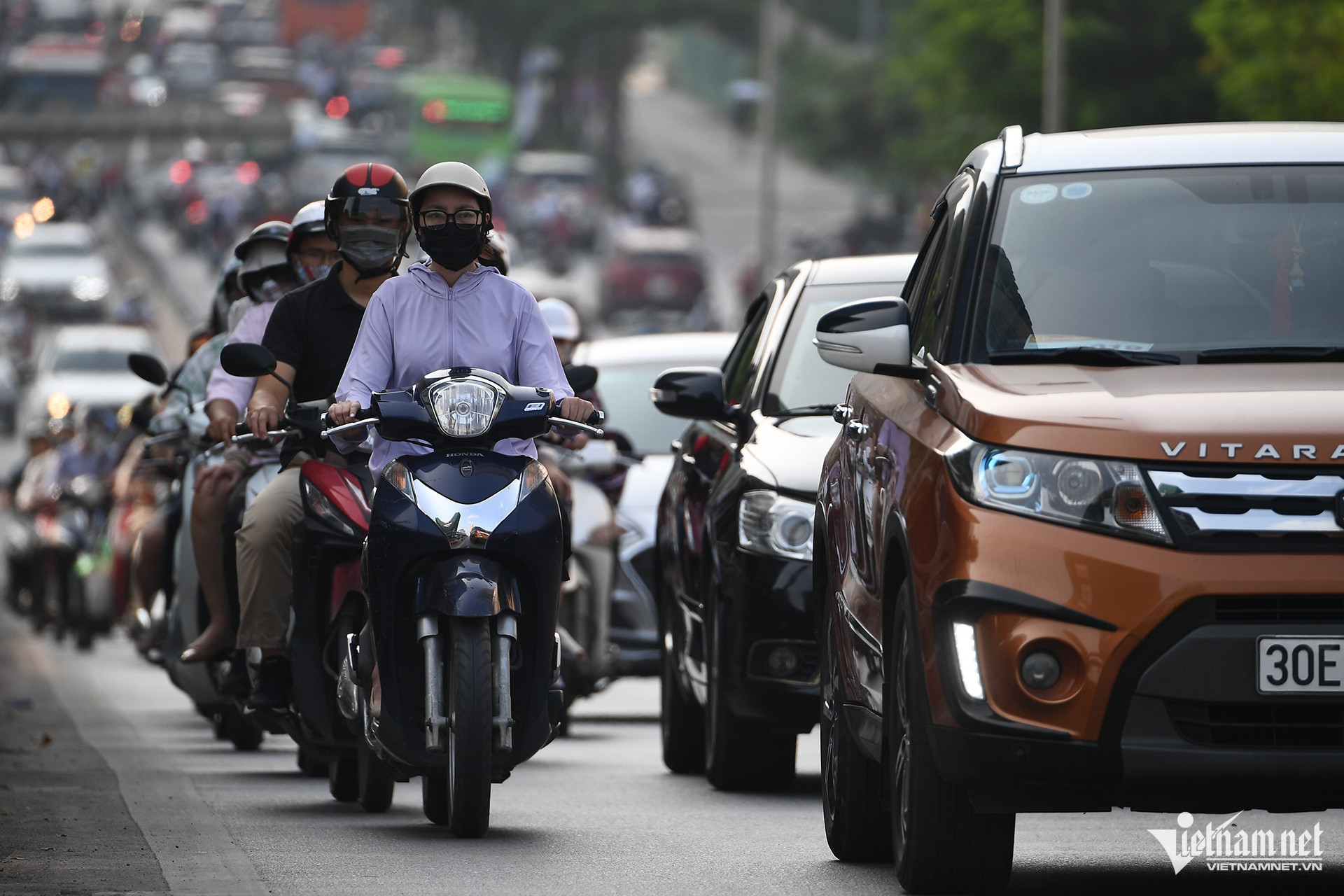
Local authorities plan to call on electric vehicle suppliers to provide support for vehicle replacement and offer price subsidies to customers.
The Government Portal on July 15 held a seminar discussing solutions to Hanoi’s environment and residents’ health protection, organized after Prime Minister Pham Minh Chinh issued a directive on urgent tasks to address environmental pollution.
The directive requires Hanoi to ensure no fossil fuel-powered motorbikes or scooters operate on Ring Road 1 by July 1, 2026. By January 1, 2028, no fossil fuel-powered motorbikes and scooters, and only a limited number of gasoline-powered personal cars, will operate on Ring Roads 1 and 2. From 2030, this will extend to Ring Road 3.
At the seminar, Duong Duc Tuan, Hanoi Vice Mayor, shared insights on the capital’s environmental issues following the Prime Minister’s Directive 20.
Tuan said that Hanoi’s pollution is threatening public health and posing challenges to the city’s development goals.
“Air pollution is a significant challenge for Hanoi. And one major cause is transport vehicles using gasoline and diesel. The modern trend is shifting to electricity and gas. Public transport like buses, urban railways, and high-speed railways are moving toward clean energy,” Tuan said.
He added that Directive 20 highlights the urgency of environmental protection, requiring decisive action.
Hanoi currently has about 1 million cars and 6.9 million motorbikes. Experts estimate that gasoline and diesel-powered vehicles, especially motorbikes, contribute to around 60 percent of air pollution. About 70 percent of these are old motorbikes, with limited emissions control.
Tuan said that Hanoi had issued multiple measures to ensure a feasible transition from gasoline-powered vehicles to green vehicles.
The city will study and issue solutions, including ways to support residents within Ring Road 1 to switch from gasoline-powered motorbikes to electric ones. Hanoi also has called on electric vehicle suppliers to assist residents with vehicle trade-ins and price subsidies.
The city also offers preferential policies on registration fees, license plate fees, and parking fees for electric cars and motorbikes.
The city is changing into a multi-modal public transport system. This network is widespread, connecting key areas, along with infrastructure serving clean energy vehicles such as electric charging stations and electric vehicle support services.
For new urban areas, planning for green and clean means of transport will be done. “The planning not only involves one company but many companies. And there are models that we have learned from many companies to build, such as on-site battery charging stations. There is no monopoly,” he said.
Hanoi is focusing on ensuring safety for electric vehicle users such as battery charging, fire prevention and rescue work.
Following the Prime Minister’s directive to eliminate fossil fuel-powered motorbikes and scooters within Ring Road 1 by July 1, 2026, Hanoi has established an inter-agency task force to address this issue.
Talking to the press, Tuan said that the city will provide maximum support to the right groups of users, ensuring convenience for residents living within the Ring Road 1, or frequently traveling to the area.
Hanoi is considering supporting the trade-in of about 450,000 gasoline-powered motorbikes within Ring Road 1.
Support policies will be developed based on a thorough review of user groups and vehicle types. The city will report to the City Party Committee and submit to the People's Council for consideration and promulgation of a policy to support most of the costs related to the conversion, such as registration fees and new electric vehicle registration fees.
Alongside personal vehicle conversion policies, Hanoi is investing in green transport infrastructure to meet residents’ mobility needs. The city plans to increase small electric buses (8-12 seats) and four-seat electric vehicles for inner-city transport within Ring Road 1.
Urban railway lines will also be accelerated, with the Cat Linh – Ha Dong and Nhon -Hanoi Station lines already serving this area, and the Ho Tay – Hoa Lac and Nam Thang Long - Tran Hung Dao lines to follow.
In the immediate time, the city prioritizes setting charging stations at static transport points, parking lots, and residential buildings
Currently, Hanoi operates 45 subsidized bus routes within Ring Road 1, including 11 electric bus routes with 126 clean energy buses, serving nearly 6,500 trips daily with frequencies of 5-20 minutes per trip.
From 2025 to 2030, the city plans to fully convert buses to green energy and open 27 new electric bus routes, adding approximately 400 vehicles.
Dinh Hieu